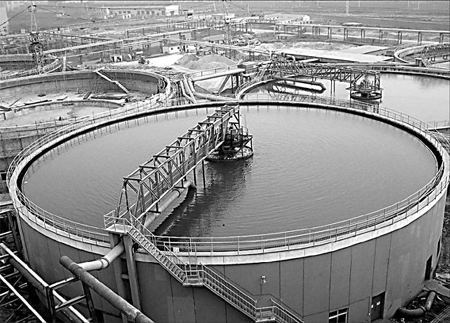As Chinese city governments throw money into water projects, one Beijing company is trying to arm them with a solution to turn sewage sludge into something useful.

The sewage treatment process collects wastewater and channels it into a sewage plant. The wastewater is pumped from one stage to another along the treatment process before it's channeled back into rivers as clean water.
But, as engineers from Beijing-based Zhongke Bolian Hi-tech Co (ZB High-tech) point out, what about the sludge?
Up to now, they tell China Business Weekly, sludge from urban and industrial wastewater treatment has been dumped into landfills, oceans and waterways.
In fact, nearly 90 percent of sludge is dumped into landfills, the Chinese Academy of Agricultural Sciences (CAAS) says.
Without further treatment, this waste product is a pollutant that can be toxic. If it accumulates, it can pose a threat to the environment - especially when all sewage plants are running in full steam. The waste product usually contains heavy metals, viruses and bacteria that's harmful to humans.
Another way
ZB High-tech has spent 10 years researching and developing a sludge recycling solution, which it has now patented.
The company was founded in 2001 by Chen Tongbin, who majored in fertilizer and composting at the CAAS in the 1990s and has worked at the Institute of Geographic Sciences and Natural Resources Research since he graduated.
ZB High-tech's solution is based on neutralizing toxic content in the sludge while retaining nutritious elements - such as nitrogen and phosphorous - to turn it into a fertilizing substance useful for organic farming.
The composting process involves two key steps - making the toxic metals passive and killing pathogenic organisms and controlling odor.
Traditional composting is based on biological decomposition of the waste's organic constituents in open air. It usually requires large areas to heap up and remix sludge, which needs to be turned over from time to time to let oxygen in and keep down the odor.
The process has two disadvantages. First, as it's out in the open, the heap can be easily washed away by rain.
Second, to make the heavy metals and bacteria passive, the sludge heap must be kept at a relatively high temperature for a week, preferably between 50 C to 60 C. So turning over the sludge isn't helpful.
This being the case, to compost the sludge and remove pollutants is inherently contradictory in the traditional method. This is where ZB High-tech comes in.
It keeps sludge in interior pools, with oxygen chambers built at the bottom of the pools to provide additional oxygen as needed. This is the world's first technology based on static oxygen consumption, as Han Yishun, the company's CEO, tells China Business Weekly.
After the toxicity is removed, the sludge becomes an organic fertilizer. It can also be mixed with chemicals to suit the market in different regions, Han says.
He also says the technology can be applied to other industries - such as paper mills, poultry farms and abattoirs - as their waste is highly organic. But the technology is not good for specialized industrial sewage plants, because the sludge produced tends to have too high a heavy metal content and is low on organic substances.
Treatment plants
The company is working with several partners to build sludge treatment plants. Most of them are small, and given the cost of moving sewage sludge, most are built next to sewage plants and paper mills.
The company's largest project is a result of its partnership with Shandong-based Chenming Paper Co, completed in 2006, which can treat 300 tons of sludge a day. The largest in China, the project consists of 24 sludge pools and is equipped with an online oxygen monitoring system.
Despite painstaking research and conclusive test results, Han says many people are still dubious about the quality of the end-product.
"It is a prejudice," Zhao Bingqiang, a CAAS professor, says. "Actually, sludge is a very good material for fertilizer if it is treated properly." The right composting method can yield a highly nutritional fertilizer.
"But landfills are clearly not the solution - rather, they're pollution," he says. "They infiltrate the soil and pollute groundwater. As for incineration, it's much more expensive than our composting solution. Our solution, as our philosophy says, is to recycle waste into a resource."
(China Daily March 31, 2008)